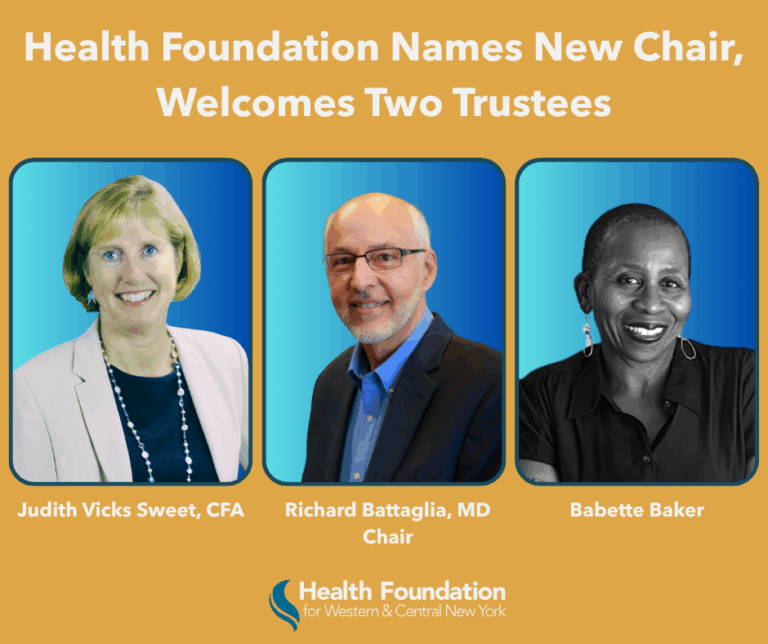Originally published in our 2022 Annual Report.
See the whole person.
That’s the philosophy of the Age-Friendly Geriatric Services Program at Community Health Center of Buffalo (CHCB), a Federally Qualified Health Center serving people in under-resourced communities in Erie and Niagara Counties.
The program, with the direction of Arvela Heider, MD; Shahla Ahmad, MD; and Ann-Marie John, PhD, MSN, uses an approach to care that addresses patients’ complex needs by prioritizing their humanity, dignity, and individual circumstances through the Age-Friendly Health Systems framework.
In 2022, with support from the Health Foundation, CHCB participated in the Age-Friendly Health Systems initiative led by the Healthcare Association of New York State. Age-Friendly Health Systems is a model developed by The John A. Hartford Foundation that uses a set of four evidence-based elements to organize the care of older adults, known as the “4Ms”: What Matters, Medication, Mentation and Mobility.
The CHCB team added their own fifth “M” – multi-complexity.
“Multi-complexity means that we are addressing the comorbidities and chronic disease that we see in the patients we serve—anything that requires specialized care,” said Dr. John. “Including multi-complexity helps us incorporate a whole-patient prevention and wellness approach that addresses those needs in collaboration with their primary care physician.”
For the CHCB team, the “what matters” question is an opportunity to build a personalized care plan with the patient so they can let their guard down and be an active decision-maker in their care plan.
“We look at what’s happening in the patient’s life when they walk out our door. I tell them right away—no type of care is going to be forced on you. We’re going to make these decisions together,” said Dr. Ahmad.
The team frequently sees the impact of this approach. Dr. Ahmad worked with an 89-year-old patient with squamous cell carcinoma who had undergone intense treatment that left her exhausted. When her cancer returned, she had to decide whether she wanted to try another round of chemotherapy.
“We had a long conversation about what really mattered to her and her family. She said she was tired from spending so much time in the hospital, and that being at home with her family was what mattered to her,” shared Dr. Ahmad. “That conversation helped her make a treatment decision that would allow her to spend the time she had at home with her loved ones, in a way that provided her dignity and a high quality of life.”
Since May 2022, more than 170 older adult patients have been cared for by the Age-Friendly Geriatric Services program, and surveys show high satisfaction from patients.
The whole-person approach also helps address common barriers to good health driven by social determinants such as transportation or food insecurity.
“Because we’re part of the community, we’re really well-networked with the support services our patients might need,” said Dr. Heider. “We don’t operate in an isolated way.”
“In a purely medical model, you would focus only on the disease. When you reframe in this way, you see the whole person and what’s important to them,” added Dr. John. “Every patient we see leaves their appointment feeling more informed, and that helps them feel more in control.”



